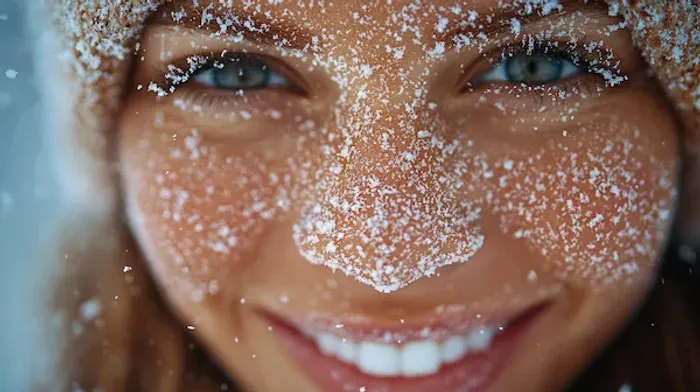Winter Eye Care: Tips to Protect Your Vision
Protect your eyes this winter with essential tips for maintaining healthy vision and preventing dryness, irritation, and other seasonal eye issues.


Introduction
As the winter season sets in, we diligently bundle up in coats and moisturise our skin, but often, we overlook one of our most sensitive organs: our eyes. The combination of harsh, cold winds outside and dry, artificial heating inside creates a challenging environment for maintaining healthy eyes. This comprehensive guide to eye care during winter will walk you through exactly why your eyes struggle this time of year and provide practical, actionable steps to keep them comfortable, healthy, and protected. Whether you're an outdoor enthusiast, someone who suffers from chronic dryness, or simply want to be proactive about your health, understanding winter eye care is crucial. We'll delve into the science behind common issues, from dry eye syndrome to the surprising risk of sunburned eyes, and equip you with a full-season strategy. Let's ensure your vision remains clear and comfortable all winter long.
Why Are Your Eyes More Vulnerable in Winter?
Winter poses a unique set of challenges for ocular health, primarily due to environmental factors that disrupt the eye's natural protective mechanisms. Unlike summer, where humidity often provides relief, winter is a season of moisture loss.
The Double Threat: Cold Air Outdoors and Dry Heat Indoors
When you step outside, the cold air holds less moisture. This dry air accelerates the evaporation of your tears. Then, when you retreat indoors to escape the cold, you're met with forced-air heating systems that drastically reduce relative humidity, sometimes to levels comparable to a desert. This constant shift between two dry environments gives your eyes little chance to recover, leading to irritation and dryness. This is the fundamental challenge of eye care in cold weather.
Understanding Your Tear Film and How Winter Disrupts It
Your eye’s surface is protected by a complex, three-layered tear film consisting of an oily outer layer, a watery middle layer, and an inner mucous layer. This film keeps your eyes lubricated, smooth, and clear. The oily layer, produced by meibomian glands in your eyelids, is crucial as it prevents the watery layer from evaporating too quickly. Cold weather can cause these glands to become less functional, leading to quicker tear evaporation. This understanding is key to addressing the root cause of winter dry eyes.
Common Winter Eye Problems You Should Know
Recognising these conditions is the first step toward effective treatment and prevention.
Dry Eye Syndrome: The Most Frequent Winter Complaint
This is the hallmark issue. Symptoms include a persistent gritty or sandy feeling, burning, itching, redness, and even blurred vision. The discomfort can be significant, especially for those who spend long hours on digital screens, as we tend to blink less when staring at devices, compounding the problem.
Excessive Tearing: A Counterintuitive Response
It may seem paradoxical, but watery eyes are a common symptom of dry eyes. When the ocular surface becomes irritated and dry, your body’s reflex is to produce an overflow of low-quality, watery tears to try and compensate. These tears lack the necessary oily components, so they spill over onto your cheeks instead of properly lubricating the eyes.
Photokeratitis: Sunburn of the Eye
Many are unaware that UV rays are just as dangerous in winter. Fresh snow can reflect up to 80% of UV radiation, effectively doubling your exposure. Photokeratitis is a painful condition akin to a sunburn on the cornea. Symptoms, which may appear hours after exposure, include pain, redness, blurriness, a gritty feeling, and sensitivity to light. This is a critical reason why protecting eyes from the winter sun is non-negotiable.
Consult an Ophthalmologist for the best advice
Your Actionable Winter Eye Care Routine
Now, let's translate this knowledge into a practical daily routine.
Hydration is Key: Inside and Out
- Internal Hydration: Drink plenty of water throughout the day. Your eyes depend on overall body hydration to produce tears.
- External Hydration: Use preservative-free artificial tears or lubricating eye drops. For moderate to severe dry eyes in winter, consider gels or ointments that provide longer-lasting relief, especially before bed.
Sunglasses are Non-Negotiable: Even on Cloudy Days
Invest in high-quality sunglasses that offer 100% UVA and UVB protection. Wraparound styles are particularly effective as they shield your eyes from wind and UV rays coming from the sides. This is essential for anyone wondering how to prevent dry eyes in winter caused by wind exposure.
Smart Use of Humidifiers to Combat Indoor Dryness
Place a humidifier in the rooms where you spend the most time, especially your bedroom. Aim to keep indoor humidity between 30% and 50%. This single step can dramatically reduce dryness and irritation, making it a cornerstone of effective winter eye care.
Protective Eyewear for Winter Sports Enthusiasts
If you ski, snowboard, or snowshoe, proper winter sports eye protection is vital. Goggles are superior to sunglasses as they provide a sealed barrier against wind, cold, and harmful UV rays. They also protect against physical hazards like tree branches or flying ice chips.
Diet and Nutrition for Winter-Ready Eyes
What you eat directly impacts your eye health.
Omega-3 Fatty Acids: Your Tear Film's Best Friend
Omega-3s, found in fatty fish (saloon, mackerel, sardines), flaxseeds, chia seeds, and walnuts, help improve the function of the meibomian glands, supporting a healthy oily layer in your tear film. This is a powerful dietary strategy for managing dry eye syndrome.
Vitamins A, C, and E: The Antioxidant Powerhouses
- Vitamin A: Essential for good vision; found in carrots, sweet potatoes, and leafy greens.
- Vitamin C: Supports blood vessels in the eyes; found in citrus fruits, bell peppers, and broccoli.
- Vitamin E: Protects eye cells from damage; found in nuts, seeds, and avocados.
A balanced diet rich in these nutrients helps fortify your eyes against environmental stressors. If your diet is lacking, consulting a doctor online with Apollo24|7 can help you determine if supplements are right for you.
Special Considerations for Contact Lens Wearers
Contact lenses can absorb moisture from the eye's surface, exacerbating winter dryness. If you wear contacts:
- Consider switching to daily disposable lenses, which tend to feel fresher and accumulate fewer deposits.
- Use lubricating drops specifically formulated for contact lens wearers.
- Reduce wear time when possible, especially on very dry or windy days, and give your eyes a break by wearing glasses.
When to Seek Professional Help
While most winter eye irritation is manageable with self-care, certain symptoms warrant professional attention. If you experience severe pain, sensitivity to light, a green or yellow discharge, or if your symptoms persist beyond two weeks despite your efforts, it's important to consult a doctor. Persistent issues could indicate an underlying condition like blepharitis or an infection.
Conclusion
Caring for your eyes during the winter months requires a proactive and mindful approach. By understanding the environmental factors at play, from evaporative cold winds to moisture-zapping indoor heat, you can take effective steps to safeguard your vision. Integrating simple habits like wearing UV-blocking sunglasses, using a humidifier, staying hydrated, and supplementing with lubricating eye drops can make a profound difference in your comfort. Remember, your eye health is an integral part of your overall well-being. If you find that your symptoms are persistent or severe, do not hesitate to seek professional advice. By following this essential guide to eye care during winter, you can ensure your eyes stay healthy, comfortable, and clear throughout the season. Share these tips with friends and family to help them protect their vision too!
Consult an Ophthalmologist for the best advice
Consult an Ophthalmologist for the best advice
Meghana Kotesh
Ophthalmologist
3 Years • MBBS, MS (OPTHALMOLOGIST )
Bengaluru
Apollo Medical Center, Marathahalli, Bengaluru

Dr. Karan Paswan
Ophthalmologist
7 Years • MBBS,MS (Ophthalmology)
Kolkata
VDC Clinic, Kolkata

Dr. Zennat Tajmin Shah
Ophthalmologist
24 Years • MBBS,DNB (Ophthalmology)
Kolkata
Titanium Eye Care, Kolkata
Dr. Padmini S
Ophthalmologist
4 Years • MBBS,MS
Bengaluru
Apollo Medical Center, Marathahalli, Bengaluru

Dr L R Seth
Ophthalmologist
36 Years • MBBS, MS, DOMS
Delhi
Apollo Hospitals Indraprastha, Delhi
Consult an Ophthalmologist for the best advice
Meghana Kotesh
Ophthalmologist
3 Years • MBBS, MS (OPTHALMOLOGIST )
Bengaluru
Apollo Medical Center, Marathahalli, Bengaluru

Dr. Karan Paswan
Ophthalmologist
7 Years • MBBS,MS (Ophthalmology)
Kolkata
VDC Clinic, Kolkata

Dr. Zennat Tajmin Shah
Ophthalmologist
24 Years • MBBS,DNB (Ophthalmology)
Kolkata
Titanium Eye Care, Kolkata
Dr. Padmini S
Ophthalmologist
4 Years • MBBS,MS
Bengaluru
Apollo Medical Center, Marathahalli, Bengaluru

Dr L R Seth
Ophthalmologist
36 Years • MBBS, MS, DOMS
Delhi
Apollo Hospitals Indraprastha, Delhi
More articles from General Medical Consultation
Frequently Asked Questions
Why do my eyes water so much in the cold wind?
This is a reflex response to protect your eyes. The cold, dry wind irritates the ocular surface, triggering your tear glands to produce a flood of watery tears to flush out the irritant and attempt to lubricate the eye. However, these tears are low-quality and simply spill over.
Can I use any over-the-counter eye drops for winter dryness?
It's best to choose preservative-free artificial tears, especially if you need to use them more than four times a day. Preservatives in some drops can cause irritation with frequent use. For chronic dry eyes in winter, a doctor can recommend specific formulations.
Are there specific foods I should eat to help with winter dry eyes?
Yes. Focus on foods rich in Omega-3 fatty acids, like salmon, flaxseeds, and walnuts, as they help improve the quality of the oily layer of your tears. Also, ensure you're eating plenty of fruits and vegetables for vitamins A, C, and E.
Is it bad to wear contact lenses all day in winter?
It can be more uncomfortable. Contact lenses can contribute to dryness. If you experience discomfort, try reducing your wear time, using lubricating drops made for contacts, or switching to glasses on particularly harsh days.
How can I tell if my eye irritation is just dryness or something more serious?
General dryness, itching, and a gritty feeling are common. However, you should see a doctor if you experience severe pain, light sensitivity, blurred vision that doesn't clear with blinking, or a thick discharge, as these could indicate an infection or other serious condition.




